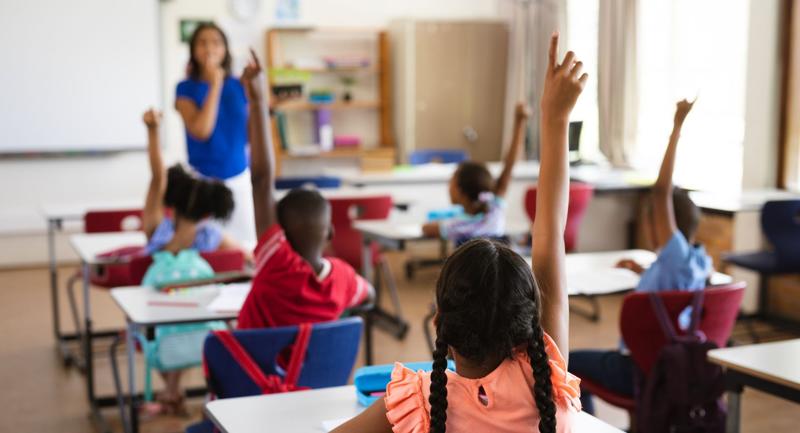When Juliana Urtubey started at a new elementary school in Las Vegas this fall, she knew outreach to families would look different. As a special education learning strategist and the newly named 2020–21 Nevada Teacher of the Year, Urtubey has made it her mission to strengthen family connections in the special education space, particularly for students learning English. Covid-19 has radically altered the way educators and families work and live, sending schools like Urtubey's into full virtual mode and necessitating responsive services for students' ever-changing and varied needs. For the 4.9 million English-language learners and the roughly 7.1 million students in special education, challenges related to learning in this altered reality are even more pronounced. What can help, Urtubey suggests, is truly knowing the people in students' lives and the situations they are in—and she believes the current climate may be allowing families and educators to work together in new ways. She spoke with ASCD about how to foster connections and mitigate cultural and linguistic challenges between families, educators, and students.
What have the last eight months been like for you and your students?
My school district is fully virtual until further notice and reassessing every 30 days. It's been really beautiful to get to know the families on a deeper level. I think a lot of teachers didn't have that opportunity before, but they do now. It's a spectrum for students. I'm a special education teacher, and how their learning or thinking difference impacts their learning is unique—even more so virtually.
For some students, they can get their work done in an hour and a half, so they're free for the rest of the day to do whatever exploration and learning and fun they want. And if they have a solid home life and support, it's been great. For other students, they need the social interaction and the proximity to do their best learning. For students whose families have been impacted by the COVID-19 crisis, experiencing homelessness or shifts in where they live, that has been really difficult. That's the collective crisis that we're all experiencing—uncertainty.
You focus on how teachers can better connect with families of English learners during the special education referral and evaluation process. What do families need to feel supported, especially now?
Right now, just like always, building relationships is something we have to do first. It's about truly knowing not just our students but [also] their families and their communities and constantly reassessing needs. If I have the trust and relationship with the family, we can go through struggles together. We need relationships that grow the grace we need to navigate distance education. It's [also about] prioritizing getting to know each other on a deeper level: What are the goals for your family at this time? What is the most important thing you're focusing on right now? For some families, it's getting by. For others, it's not losing IEP goal success or progress. We have to be humble in knowing that our job is to support families' goals and hopes.
The coronavirus crisis has been particularly difficult for students with special needs. What do you see happening with connections right now?
The bright spots are seeing family support. We have a student who is in a self-contained autism program. He communicates nonverbally, his range of motion is limited, and to see the way his parents and [caregiver] help him during the classes just moves me. He needs an adult next to him to be able to function and participate in the class, and that's what so many families on every level are doing.
For families who aren't able to do that, we have technologies like GoGuardian. When a student is using our school portal, a teacher can see their screen during our school session times and copy and paste links into the student's Chromebook to take them where they need to be. We have a student in a prekindergarten classroom who is being supported by his great grandma, and she was frustrated by the technology because her eyesight and hearing is limited. A tool like that is lifechanging. Great grandma still sits next to him, but we can handle the tech piece on our end.
What about students for whom distance learning isn't working?
Our state has had tremendous partnerships with the private industry in terms of devices and Wi-Fi hotspots. We're at around 98 percent of students who have access. There is still a small percentage of students—I'd dare to say nationwide—with whom all the tried methods and strategies aren't working. I've been thinking a lot about the farm worker children and how they get access to education. [The USDA ERS Distance Learning program] follows them wherever they might be migrating with their family. It's a flexible schedule in the evening, and there are adults who can support the children.
I wonder if we can roll out something like that at the state or district level for families for whom this is not working and where the school has done beyond its due diligence. Once teachers are out of strategies to connect with the families, we do home visits to collaborate with the families. It's a small percentage of students, but each student counts.
Students who are bilingual, simultaneously learning two languages, or developing their English are at risk of being under- or over-represented for special education services. How does connecting with families help mitigate this problem?
It's a more holistic, systems-type conversation to ensure students have equitable access to rigorous, explicit, systematic instruction. It's how to provide teachers the tools and support to make sure all of our students have access to foundational skills consistently. Whether they're at risk for being identified for a disability or another eligibility or whether they're learning English as a second language or concurrently learning English and Spanish together, it works for all students to have explicit, sequential, research-based interventions. A lot of this is being rolled out through multi-tier system of supports (MTSS), which I really appreciate, because Response to Intervention (RTI) isn't enough. We need a more holistic approach.
In a recent Educational Leadership article, you wrote that "the friction between a system that expects [families] to engage with their child's education in "typical" ways and their own fears of deportation or discrimination is a barrier that keeps them from fully participating in schools." Could you talk more about how to ease this friction?
It starts with a very careful responsive equity lens. This is something teachers can do at an individual and school level, thinking about how is the application of equity resulting in my school? Everyone thinks they're being equitable, but then the data tells us otherwise. What are the routines and practices and invisible barriers that might be present in our school design and practice. If it's a family that might be hesitant to share personal information with a school, it might just be a conversation about FERPA and how a school cannot share personal info with outside agencies. That can do a lot in terms of putting a family at ease. Teachers can start off with students who are presenting challenges for attendance behavior work completion and plan backwards, but in the same way a school or a district can do this.
What are some of your go-to places to find support and resources?
My go-to for working with families or anything in the special education realm is always Understood and the National Council for Learning Disabilities. My go-to for multilingual education and bilingual education is Colorín Colorado. They're tied to Reading Rockets, which is a great resource as well. When it comes to teacher leadership, reflection, and professional development, it's the National Board. They have been tremendous in terms of finding out what all teachers need and providing support. They've probably done close to 100 webinars since March, bringing in experts from the field, and they've also extended deadlines for teachers who are candidates for National Board certification.
In terms of equity, I am a part of the National Board Network of Accomplished Minoritized Educators (NAME). We have been doing virtual mixers with speakers, an affinity space for teachers for color to be open and vulnerable about our specific needs. We're also rolling out core webinars on topics like SEL and inclusive book libraries that are open to all teachers, but they are led by and keeping in mind teachers of color in design and implementation. I love anything visible learning by John Hattie and visual distance learning by Jill Harrison Berg in ASCD publications. And more than anything, our colleagues are the best in terms of filling in our needs.
Anything else to add?
The most important thing right now is to keep telling teachers and families thank you. We see the amount of dedication, love, work, and grace that is being mutually provided. I am immensely grateful for the mountains that families are moving to make whatever situation work. I hear parents being flexible with teachers [and] understanding when things aren't working or when mistakes are made. We need to center on the fact that we are all doing the best that we can, but also remember the gratitude part. Collaboration and partnership are going to make education better for everybody.
This interview has been edited for length and clarity.
Juliana Urtubey (@urtublj) is a 4th- and 5th-grade special education teacher working in inclusion and resource settings in Las Vegas. She is a National Board for Professional Teaching Standards fellow, a Teach Plus Nevada fellow, an Understood Mentor fellow, and a member of the ASCD Advisory committee.







